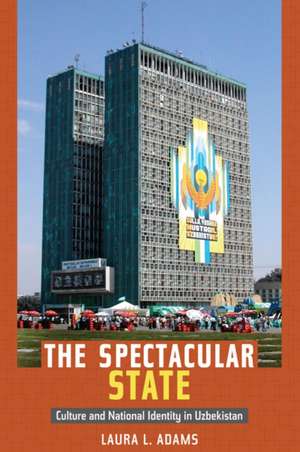The Spectacular State – Culture and National Identity in Uzbekistan: Politics, History, and Culture
Autor Laura L. Adamsen Limba Engleză Paperback – 4 feb 2010
Din seria Politics, History, and Culture
-
 Preț: 240.73 lei
Preț: 240.73 lei -
 Preț: 210.26 lei
Preț: 210.26 lei -
 Preț: 247.63 lei
Preț: 247.63 lei -
 Preț: 265.79 lei
Preț: 265.79 lei -
 Preț: 238.39 lei
Preț: 238.39 lei -
 Preț: 261.56 lei
Preț: 261.56 lei -
 Preț: 263.47 lei
Preț: 263.47 lei -
 Preț: 306.60 lei
Preț: 306.60 lei -
 Preț: 264.26 lei
Preț: 264.26 lei -
 Preț: 305.61 lei
Preț: 305.61 lei -
 Preț: 262.70 lei
Preț: 262.70 lei -
 Preț: 303.33 lei
Preț: 303.33 lei -
 Preț: 262.52 lei
Preț: 262.52 lei -
 Preț: 212.48 lei
Preț: 212.48 lei -
 Preț: 261.56 lei
Preț: 261.56 lei -
 Preț: 262.32 lei
Preț: 262.32 lei -
 Preț: 230.02 lei
Preț: 230.02 lei -
 Preț: 237.47 lei
Preț: 237.47 lei -
 Preț: 335.88 lei
Preț: 335.88 lei -
 Preț: 300.83 lei
Preț: 300.83 lei -
 Preț: 261.56 lei
Preț: 261.56 lei -
 Preț: 238.39 lei
Preț: 238.39 lei -
 Preț: 238.01 lei
Preț: 238.01 lei -
 Preț: 262.14 lei
Preț: 262.14 lei -
 Preț: 312.74 lei
Preț: 312.74 lei -
 Preț: 260.41 lei
Preț: 260.41 lei -
 Preț: 310.83 lei
Preț: 310.83 lei -
 Preț: 300.24 lei
Preț: 300.24 lei -
 Preț: 335.12 lei
Preț: 335.12 lei -
 Preț: 234.61 lei
Preț: 234.61 lei -
 Preț: 256.06 lei
Preț: 256.06 lei
Preț: 223.65 lei
Nou
Puncte Express: 335
Preț estimativ în valută:
42.80€ • 44.52$ • 35.33£
42.80€ • 44.52$ • 35.33£
Carte indisponibilă temporar
Doresc să fiu notificat când acest titlu va fi disponibil:
Se trimite...
Preluare comenzi: 021 569.72.76
Specificații
ISBN-13: 9780822346432
ISBN-10: 0822346435
Pagini: 256
Ilustrații: 7 b&w photographs
Dimensiuni: 162 x 234 x 16 mm
Greutate: 0.36 kg
Editura: MD – Duke University Press
Seria Politics, History, and Culture
ISBN-10: 0822346435
Pagini: 256
Ilustrații: 7 b&w photographs
Dimensiuni: 162 x 234 x 16 mm
Greutate: 0.36 kg
Editura: MD – Duke University Press
Seria Politics, History, and Culture
Recenzii
"In this finely nuanced study, Laura L. Adams presents the first serious analysis of national identity in post-Soviet Uzbekistan. Focusing on the elaborate spectacles that mark Navroz, the spring holiday, and Independence Day every year, Adams shows how the Soviet legacy, global norms, and state interests intersect to shape the ideology of national independence. With its sophisticated theoretical underpinnings, The Spectacular State makes an important major contribution to postsocialist and postcolonial studies.--Adeeb Khalid, author of Islam after Communism: Religion and Politics in Central Asia
"Better than anyone else I have read on Central Asia, Laura L. Adams takes seriously what the local people say about the ethnographic present, and she uses her sociological background to explain how it is that they come to such conclusions. Yet The Spectacular State is not only a major sociological account of the region; it is also a significant contribution to broader social scientific discourses about the state and culture.--Michael D. Kennedy, author of Cultural Formations of Postcommunism: Emancipation, Transition, Nation, and War
"Drawing on her own observations and interviews with artists, intellectuals and bureaucrats, Adams looks at how the Uzbek government has staged massivecultural extravaganzas in an attempt to produce and express national identity." Survival
"Better than anyone else I have read on Central Asia, Laura L. Adams takes seriously what the local people say about the ethnographic present, and she uses her sociological background to explain how it is that they come to such conclusions. Yet The Spectacular State is not only a major sociological account of the region; it is also a significant contribution to broader social scientific discourses about the state and culture.--Michael D. Kennedy, author of Cultural Formations of Postcommunism: Emancipation, Transition, Nation, and War
"Drawing on her own observations and interviews with artists, intellectuals and bureaucrats, Adams looks at how the Uzbek government has staged massivecultural extravaganzas in an attempt to produce and express national identity." Survival
Notă biografică
Textul de pe ultima copertă
"Better than anyone else I have read on Central Asia, Laura L. Adams takes seriously what the local people say, and she uses her sociological background to explain how it is that they come to their conclusions. Yet "The Spectacular State" is not only a major sociological account of the region; it is also a significant contribution to broader social scientific discourses about the state and culture."--Michael D. Kennedy, author of "Cultural Formations of Postcommunism: Emancipation, Transition, Nation, and War"
Descriere
Examines the ways that cultural elites were mobilized as part of Uzbekistan's nation-building project in the early years of independence, and how institutional and cultural restraints on nation building now function.
